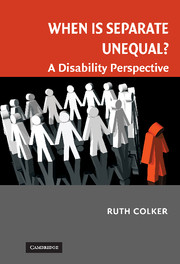Book contents
- Frontmatter
- Contents
- Preface
- Acknowledgments
- 1 Introduction
- 2 Anti-Subordination Above All: A Disability Perspective
- 3 The Mythic 43 Million Americans with Disabilities at the Workplace
- 4 K–12 Education
- 5 Higher Education and Testing Accommodations
- 6 Voting
- 7 Reflections on Race: The Limits of Formal Equality
- Index
6 - Voting
Published online by Cambridge University Press: 05 June 2012
- Frontmatter
- Contents
- Preface
- Acknowledgments
- 1 Introduction
- 2 Anti-Subordination Above All: A Disability Perspective
- 3 The Mythic 43 Million Americans with Disabilities at the Workplace
- 4 K–12 Education
- 5 Higher Education and Testing Accommodations
- 6 Voting
- 7 Reflections on Race: The Limits of Formal Equality
- Index
Summary
In recent years, federal law has made important inroads for individuals with disabilities by seeking to make polling places more accessible. While that change has been important, this chapter argues that an integration presumption has caused disability rights advocates to ignore another aspect of voting that must become more accessible – absentee voting. This chapter argues that absentee voting needs to undergo some fundamental changes so it can become a vehicle for improving voting participation by individuals with disabilities. By focusing on the goal of increasing participation, rather than merely integration, we can make voting more accessible to individuals with disabilities. From an anti-subordination perspective, we should be seeking to enhance the basic citizenship rights of individuals with disabilities by improving the voting process.
In recent decades, absentee voting has become a central feature of our electoral landscape as a result of the liberalization of many states' laws and individual voters' decisions to vote in the comfort of their homes. All states now allow at least some categories of voters to cast their votes before Election Day, most commonly by mail. Most states permit “no excuse” absentee voting, under which ballots may be cast by mail regardless of whether the voter provides an excuse for not going to the polls on Election Day. Several states allow some classes of voters to obtain permanent absentee status, obviating the need to apply for an absentee ballot before every election.
- Type
- Chapter
- Information
- When is Separate Unequal?A Disability Perspective, pp. 217 - 247Publisher: Cambridge University PressPrint publication year: 2008



